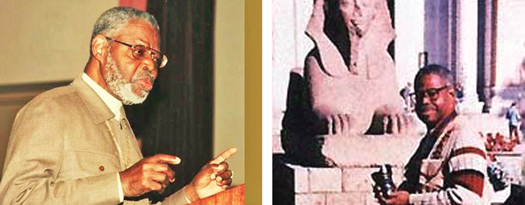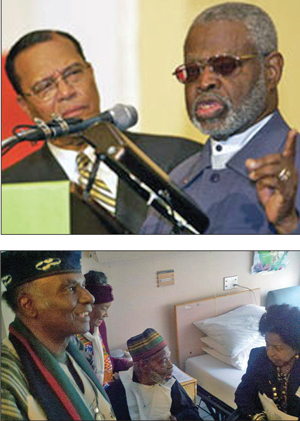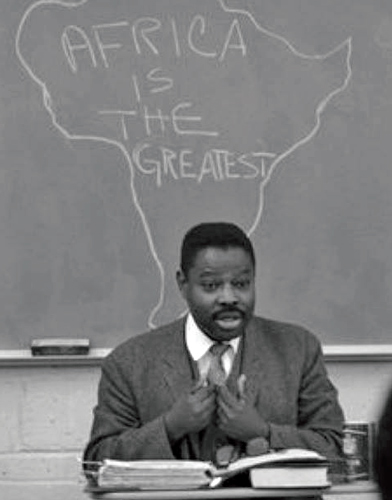
NEW YORK (FinalCall.com) – Dr. Yosef A. A. ben-Jochannon, engineer, linguist, anthropologist and historian died in a New York City nursing home on March 19 at the age of 97.
“Dr. Ben” as he was affectionately referred to was born on December 21, 1918 to a Puerto Rican mother and an Ethiopian father, in what is known as the “Falasha” Hebrew community in Gondor, Ethiopia.
His formal education began in Puerto Rico and continued in The Virgin Islands and in Brazil, where he attended elementary and secondary school. Dr. Ben earned a B.S. degree in Civil Engineering at the University of Puerto Rico, and a Master’s in Architectural Engineering from the University of Havana in Cuba. He received doctoral degrees in Cultural Anthropology and Moorish History from the University of Havana and the University of Barcelona in Spain.

Dr. ben-Jochannon was an adjunct professor at Cornell University in Ithaca, N.Y., from 1976 to 1987. He has written and published 49 books and papers, revealing much of his findings from his studies of Egypt. Two of his better-known works: “Black Man of the Nile” and “Africa Mother of Major Western Religions.”
“We have lost another great giant to get to Black people the research of our glorious ancient past,” said the Honorable Minister Louis Farrakhan of the Nation of Islam. “His legacy is solid in what Allah says that He would not waste the work of any worker and what a great worker he was and is, and so long as our people are deprived of the knowledge of self and seek the knowledge of self, he will be one of the sources that they seek,” said Min. Farrakhan.
He referred to Dr. Ben as the last of a great list of scholars of ancient Black civilizations and Black history, which included the late John Henrik Clarke, Cheikh Anta Diop, Ivan Van Sertima and Chancellor Williams.
Dr. Leonard Jeffries told The Final Call that Dr. ben-Jochannon was the “gift that keeps on giving.” “Anybody who can remain on this planet 97 years means we have had a gift,” he said. It was very meaningful to have, Dr. Ben say: “Here”, this knowledge is for our people,” said Dr. Jeffries, who was attending the annual conference of the Association for the Study of Classical African Civilizations, an organization that Dr. ben-Jochannon co-founded in 1984. “He did it like nobody else,” Dr. Jeffries said. We need to have a term for him, Dr. Jeffries said. “The enlightened one!” he exclaimed.
The former head of the Africana Studies Department at City College in New York City reminded The Final Call that he was sitting next to Dr. ben-Jochannon on March 16, 2002, when Min. Farrakhan called for the noted historian to join him in the pulpit at the Salem United Methodist Church in Harlem.
Dr. ben-Jochannon enthralled the packed church there to celebrate the Holy Day of Atonement by saying he was “moved” by Min. Farrakhan’s speech. “I find Min. Farrakhan to be the only Black man that stands up for his people,” he said. The “Nation of Islam is the premiere group working for the benefit of Black people,” he added.
Immediately after the news of his death began to circulate, responses were posted to social media networks. “Dr. Ben changed my life,” stated Gary Imhotep Byrd, nationally renowned radio talk show host on Facebook.com. “One of the last great Race Men. He was a brilliant historian. He was committed to his local/national/global Afrikan community, and he was funny, and sharp–and gifted,” wrote Amsterdam News editor Nayabe Arinde on Facebook.

“One of the greatest influences of my life has made his transition. One of our greatest scholars, historians and activists, he has had a profound impact on African people,” wrote Gregory Taylor on Facebook, a longtime Pan African activist living in Staten Island, N.Y. Scholar Runoko Rashidi added via Facebook, “Well, I guess that everybody has heard now that Dr. Ben-Jochannan has passed on. He is an Ancestor now. Thank you for your contributions my brother. You lived fully and died loved. Bless you.”
“Dr. Ben opened African education to the ordinary person,” said Dr. Jeffries.
“He was so accessible,” Sister Empress Phile’ Chionesu, director of the Philadelphia-based National Woman March Movement and co-convener of the historic Million Woman March told The Final Call. “I had the opportunity to have him as a professor at Temple University. My cultural African perspective scholar,” she said.
Bill Fletcher, Jr., an advocate for racial justice, labor and international human rights, said: “When you look at his body of work–what you see is his thirst for knowledge that he used as a weapon against White supremacy.”
Dr. Ben was “deft at dismantling” the myth of White superiority, noted Dr. Ron Daniels, director of the Institute of the Black World 21st Century in New York. “Clearly placing African people at the center, a force for the liberation of our people,” Dr. Daniels said.
Dr. ben-Jochannan told the audience at the Salem United Methodist Church in Harlem in 2002 that he wanted to donate his private library of more than 35,000 books to the Nation of Islam. Min. Farrakhan and the Nation of Islam had come to Harlem to observe the Holy Day of Atonement and seventh anniversary of the Million Man March. The scholar was receiving specialized care at the Bay Park Nursing Home when he passed.
“He was one of last great race men of his era,” said Ms. Arinde, of the weekly Black Amsterdam News newspaper. “He was a master teacher who just wanted to share our amazing African history. He was a man of the people. He was always amongst us, educating, and sharing. Sitting with him was a gift of tremendous proportions. He was loved, and he loved his people.”
“Of all our greats, Dr. Ben physically took tens of thousands of scholars, activists, students and associations to the Nile Valley to make the pages of his book more authentic,” shared his colleague, Brother Reggie Mabry, with the Amsterdam News. “We saw our own experiences of what he wrote. … For that the Black world is indebted to this Black man of the Nile and his family.”












